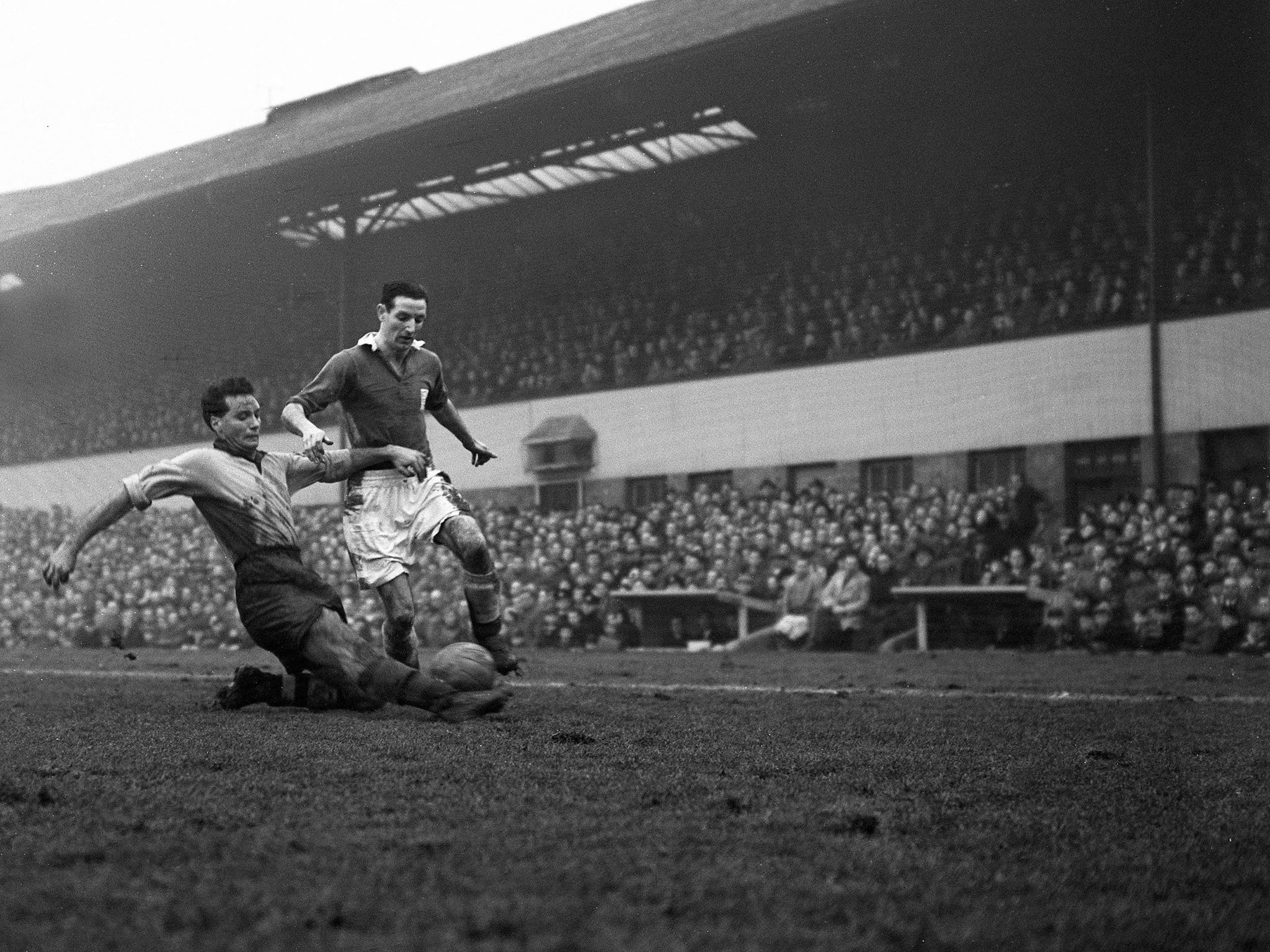Eddie Stuart: Powerful and charismatic defender who became the beating heart of the mighty Wolves side of the 1950s

Your support helps us to tell the story
From reproductive rights to climate change to Big Tech, The Independent is on the ground when the story is developing. Whether it's investigating the financials of Elon Musk's pro-Trump PAC or producing our latest documentary, 'The A Word', which shines a light on the American women fighting for reproductive rights, we know how important it is to parse out the facts from the messaging.
At such a critical moment in US history, we need reporters on the ground. Your donation allows us to keep sending journalists to speak to both sides of the story.
The Independent is trusted by Americans across the entire political spectrum. And unlike many other quality news outlets, we choose not to lock Americans out of our reporting and analysis with paywalls. We believe quality journalism should be available to everyone, paid for by those who can afford it.
Your support makes all the difference.When Eddie Stuart flexed his muscles strong men flinched.
The tall, steely, darkly charismatic South African was one of the cornerstones of Wolverhampton Wanderers’ rearguard as Stan Cullis’s exhilarating, hard-running side lifted three League titles during the 1950s and vied with Manchester United’s Busby Babes as the team of the decade.
Cullis, the Iron Man of Molineux, wouldn’t have bothered with a defender who wasn’t pacy, powerful and resilient, and Big Eddie was all of those, but there was an added dimension required by the demanding Wolves manager. He wanted physical domination to be augmented by mental dominion over opposing attackers and Stuart’s natural aura of authority was ideal for the purpose.
Usually matching left-wingers stride for stride as a right-back, he had the stature to double as a centre-half, his aerial work commanding and his marshalling of colleagues responsible and sometimes inspirational. A South African Cup-winner with his local club, Johannesburg Rangers when he was 16, Stuart was growing up in a deeply religious family and considering a future as a church minister when he was scouted by Wolves, who signed him as a 19-year-old in January 1951. Cullis was well blessed with redoubtable full-backs – the likes of Jack Short, Bill Shorthouse and Roy Pritchard – but he viewed the teenager as a golden prospect for the future, and so it proved.
Due to an injury crisis Stuart made his senior debut as an emergency centre-forward, scoring in a 4-1 home defeat by West Bromwich Albion in April 1952, what proved to be his only goal in an 11-year Molineux tenure encompassing more than 300 games.
A tropical disease contracted on a holiday in his homeland caused him to miss the whole of the following season, and almost cost him his life, but he recovered in time to play the last dozen games of 1953-54 as Wolves took the first League championship in their history. Thereafter he ousted Short, who soon left for Stoke City, and became a regular for the next eight seasons, usually in the No 2 shirt, but occasionally filling in as central stopper.
Like most of his comrades, Stuart excelled in a series of floodlit friendlies against top European opposition which caught the imagination of the public, some of the clashes pre-dating the European Cup. He was particularly impressive in direct opposition to the Hungarian flyer Zoltan Czibor as Honved were beaten 3-2 on a misty night at Molineux in December 1954, and he shone, too, when confronted by Real Madrid’s peerless speed merchant Francisco Gento as the European champions were undone by the same score three years later.
With Cullis rejuvenating his side with young talent, Wolves grew in potency and were crowned League champions in 1957-58 and 1958-59, missing a hat-trick by a single point as Burnley pipped them on the final day of 1959-60. There was consolation for that disappointment in winning the FA Cup, but not, alas, for Stuart, who had succeeded Billy Wright as captain when the England centre-half had retired in 1959.
Following the Sharpeville Massacre of March 1960 in the Transvaal, in which 69 protesters were shot by white guards, as a South African Stuart fell victim to an unfair backlash. He was bombarded by hate mail, his general store near Molineux was targeted and he was booed by Wolves’ own fans, all at a time when he was engaged in a battle for the right-back slot with George Showell. Unsurprisingly he was distracted and dropped, and although Cullis ensured that he collected an honorary winner’s medal, it meant nothing to him.
Stuart was a tough character, though, bouncing back for two more seasons in the golden shirt before accepting an £8,000 move to Second Division Stoke in July 1962.
At the Victoria Ground, as captain, he became an inspirational part of Tony Waddington’s so-called “Grandad’s Army”, a collection of canny veterans – with the incomparable 47-year-old outside-right Stanley Matthews aided by thoroughbreds such as Dennis Viollet, Jimmy McIlroy and Jackie Mudie – who lifted the divisional title to reach the top flight in the spring of 1963.
Stuart remained influential as the Potters consolidated at the higher level before switching to Fourth Division Tranmere Rovers, valued at £4,000, in August 1964. After twice missing promotion from the basement narrowly with the Merseysiders, he achieved it as a champion with Stockport County in 1966-67, remaining at Edgeley Park for one more season before leaving the League to spend four years with Worcester City, who made him player-manager.
An enterprising, intelligent character, Stuart went on to run hairdressing salons in the Wolverhampton area.
Edward Albert Stuart, footballer: born Johannesburg 12 May 1931; played for Wolverhampton Wanderers 1951-62, Stoke City 1962-64, Tranmere Rovers 1964-66, Stockport County 1966-68; died Wrexham 4 November 2014.
Join our commenting forum
Join thought-provoking conversations, follow other Independent readers and see their replies
Comments